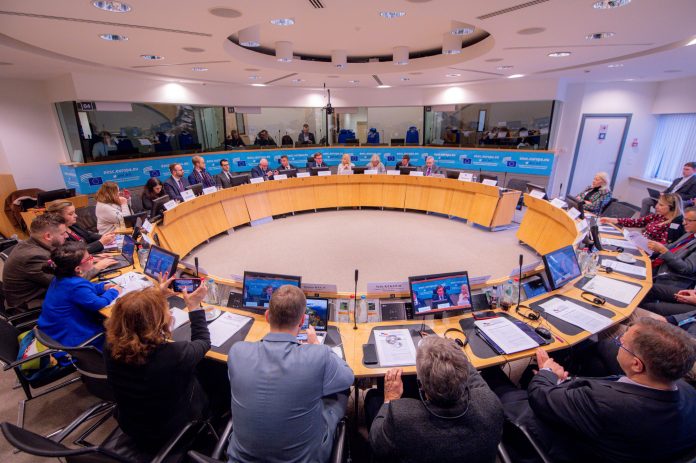Ahead of the EU-Western Balkans Summit, the European Economic and Social Committee (EESC) met with representatives of Montenegrin civil society on December 7, 2023, to assess Montenegro’s progress in the accession process, especially in the area of public administration reform.
The participants of the meeting, which was held within the framework of the Joint Consultative Committee between the EU and Montenegro, expressed concern about the reduction in the capacity of the Montenegrin public administration to respond to the growing demands of the EU agenda. However, as it was pointed out, with the new Government, a window of opportunity opens for progress in the necessary reforms within the process of the accession negotiations.
Opening the meeting, Minister of European Affairs Maida Gorčević pointed out: “When the Government is sincerely committed to an open and transparent dialogue, to negotiations based on the interests of citizens without political calculations, we have a situation in which both our partners and political opponents are satisfied so that we can share responsibility and credit for opening a new perspective of accession negotiations.”
JCC members stressed that this is the first meeting after the election of the new president of the EESC, Oliver Ropke, who submitted an initiative for opening the doors of the EESC to candidate countries and including their representatives in the work of the Committee.
Welcoming this decision of the EESC, by the new enlargement methodology, Gordana Đurović, co-chair from the Montenegrin side, said: “The Joint Consultative Committee lives with the challenges of the European integration of Montenegro and contributes to strengthening the public debate with key stakeholders, inclusively and transparently. The members of ZKO from Montenegro look forward to participating in the EESC initiative “Initiative for candidates in the enlargement process (ECM) – an important step for the inclusion of civil societies from the enlargement countries, which are the beating heart of the EU integration project”.
Member of the EESC and co-chair from the EU side, Decebal-Ștefăniță Padure, said: “In this term of the JCC, we look forward to close cooperation with our Montenegrin colleagues and we want to see how the country gradually progresses towards EU membership. Organized civil society from both the EU and Montenegro will do everything possible to positively contribute to this common goal.”
Regarding the Commission’s recent report on Montenegro, EESC President Oliver Ropke said: “Montenegro has always been a leader in the EU enlargement process. I fully believe that they will continue on that path with the new government. We need clear commitments and actions. I cannot emphasize enough here that a strong civil society is crucial for any functional democracy. More than ever, Montenegrin civil society can count on our unwavering and active support.”
As part of the discussion on obligations within Cluster 1, the members of JCC emphasized the importance of public administration reform, especially in cooperation with civil society. They appealed to the Montenegrin authorities to urgently change the legislative framework, which was reflected in the final declaration published after the meeting.
In particular, the members requested an amendment to the Law on Prevention of Corruption, which treats representatives of social partners and civil society organizations as officials only because they are formally appointed by the Government of Montenegro. This, they claim, is not by their mission to represent the interests of organized social partners, calling into question their autonomy and independence as non-governmental and non-profit organizations.
The declaration will be distributed to the Montenegrin authorities and all relevant EU institutions.
You can download the declaration from the link below.
European Economic and Social Committee | (Europa.eu)
Additional information:
JCC is a civil society platform established between the EESC and Montenegrin civil society. The first meeting was on October 2, 2012. This joint body enables civil society organizations from both sides to monitor the country’s accession negotiations. It is also a platform for discussing issues of common interest and informing the public about upcoming challenges during the accession period.


